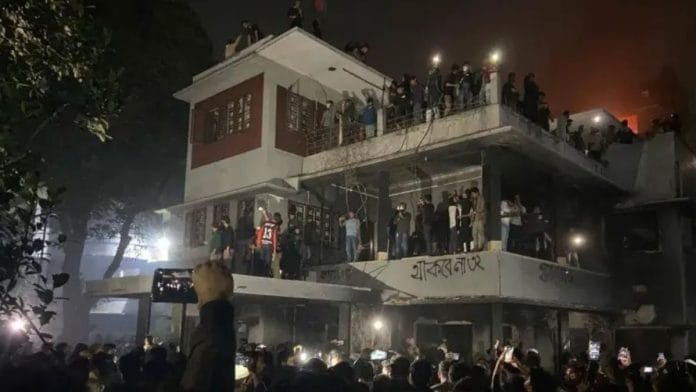New Delhi: Even as former Bangladesh Prime Minister Sheikh Hasina delivered a live virtual address on the significance and legacy of the Bangabandhu Museum, a group of students and agitators stormed the building in Dhanmondi, Dhaka, torching and demolishing it. Footage of the destruction quickly went viral on social media while a tearful Hasina reminisced about the history of her former home Wednesday.
“Why this demolition? I ask the people, what have I done to anger you so much? Why are you so scared of a house? If you forget your history, you will never progress,” she said, as the demolition continued.
According to the Daily Star, the demolition is still underway, with an excavator actively tearing down the building.
The protest erupted following a Facebook-organized event called the “Bulldozer March,” which drew large crowds to Dhanmondi 32 at 7.30 pm on Wednesday. By 9.30 pm, the building was engulfed in flames.
During her speech between 9 and 10 pm Wednesday, Hasina reminded the youth of the importance of “remembering history”.
The museum, formerly the residence of Bangladesh’s founding father, Sheikh Mujibur Rahman, was attacked late in the evening, shortly after Hasnat Abdullah, convener of Students Against Discrimination (SAD), declared on his verified Facebook page that Bangladesh would be “freed of [a] fascist bastion” by Wednesday night. Adding to the tensions, local government official and youth and sports adviser Asif Mahmud Sajib Bhuiyan fueled the unrest with a social media post that read, “Let there be festivity”.
The house had previously been attacked and set on fire by an angry mob in August, following the fall of the Awami League government, and had remained abandoned ever since.
Also read: After Hindus, Bangladeshi tribals targeted by radical Islamists—journalist & activist Parban Chakma
Yunus, Pakistan, and forgotten history
Hasina, meanwhile in her speech—broadcast on the Bangladesh Awami League channel—barely differed from her previous speeches post ouster and spoke at length about her party’s achievements and her father’s legacy. She also attacked Mohammad Yunus, chief adviser of the interim government, calling him a “fascist” and accusing him of manipulating students for his “greed for power”.
The notable difference was perhaps her attack on Pakistan, in light of growing Bangladesh-Pakistan relations.
“These people who are attacking the constitution and the flag of the country perhaps do not like the freedom from Pakistan. They would have preferred to remain a colony under them,” Hasina said.
She continued, “This country was freed due to Bangabandhu’s struggle to free it from Pakistan. Had we still been in Pakistan, we would have had no right to language or even jobs. All of us would have been unemployed. Pakistan has no Bengali generals till date. Have you heard of any?”
Addressing the youth, Hasina contrasted her view of Bangladeshi youth from that of Yunus. While Yunus had previously described them as “the most powerful in human history” in a speech at the Davos Forum, Hasina called them “soft” and accused them of being manipulated to participate in a “malicious campaign to throw her out of power”.
“I had given the youth of this country resources and transformed the country into a digital Bangladesh so that the youth who will carry the future of this country forward could learn, educate, and employ themselves. Instead, the youth is busy disrespecting its teachers and garlanding them with shoes. They have been brainwashed by this man who is greedy for power,” Hasina said.
Hasina went on to label Yunus as “a beimaan munafiq” (a dishonest hypocrite), accusing him of coming to power “illegally and unconstitutionally on the dead bodies of innocent civilians”.
“He begged me to lend him money for Grameen Bank, promising me that the profits would be returned back to the bank. I invested 400 crore rupees in it. Not a penny came back. He laundered them all for his personal gains. A person’s greed has now led the country to the brink of destruction”.
In her emotional speech, she then called Dhanmondi “the last remaining piece of my family” that she and her sister had clung to.
“Bangladesh was not created for a party, but for the people of Bangladesh. The last remaining history is being destroyed but they cannot destroy history. I gave it to the public, instead of keeping it for personal use.”
She also indicated her eventual return to the country.
“I keep wondering why I was kept alive despite multiple assassination attempts, perhaps I have a higher purpose. We will rebuild, and we will come back stronger. By 2041, Bangladesh will be the most prosperous nation,” she concluded.
(Edited by Zinnia Ray Chaudhuri)
Also read: Awami League has lost moral right to contest next polls in Bangladesh, says BNP youth wing leader






